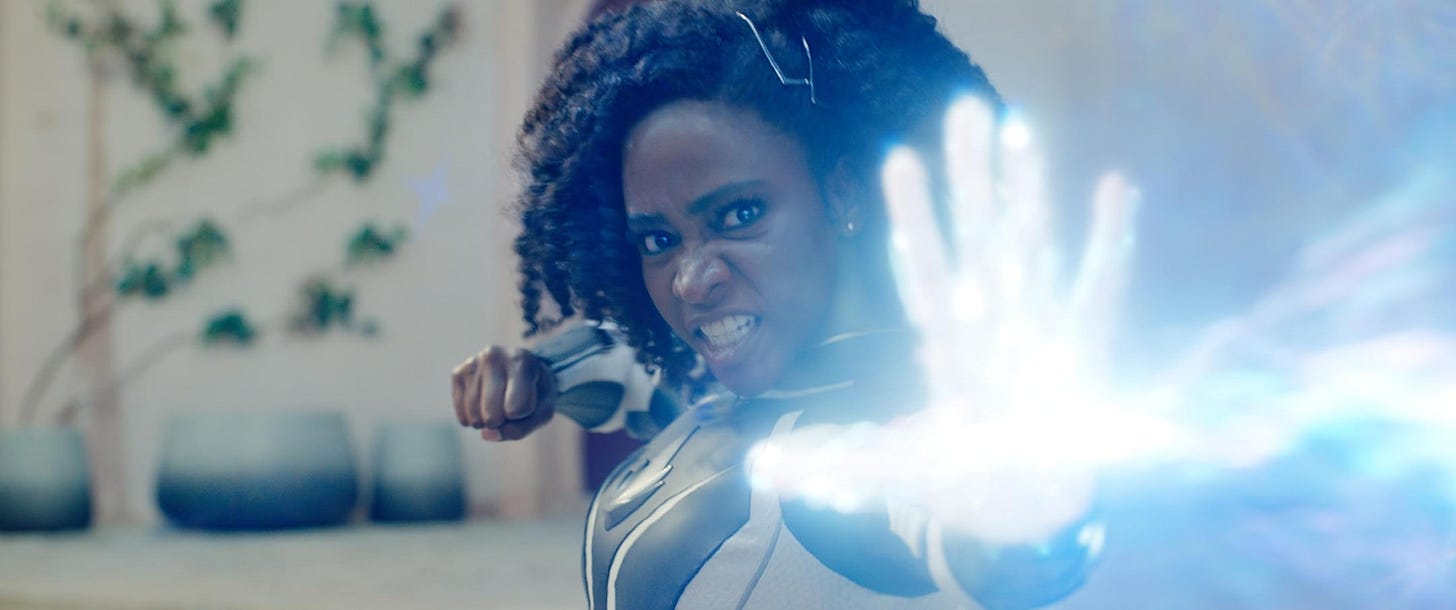‘The Marvels’ Review
Content to be hashtag content.

THE MARVELS HAS THE DECENCY to be the shortest Marvel movie at 105 minutes, the quick pace meaning that you never really stop to question little things like “What, precisely, are the powers of each individual member of this ad-hoc super team?” or “How is a wormhole siphoning off Earth’s sun’s corona supposed to restart another star halfway across the galaxy?” The answer to these and every other question you have is, basically, “space magic,” so there’s no reason to get hung up on them anyway.
The quick pace means there’s no real time to introduce viewers to the two leads who have heretofore only shown up on the Disney+ TV shows that fewer and fewer people are tuning in to: there’s Kamala Khan, aka Ms. Marvel (Iman Vellani), who has a bracelet that can turn light into solid matter, and Monica Rambeau, aka Captain Rambeau (Teyonah Parris), who can . . . see everything on the electromagnetic spectrum and also shoot lasers out of her hands and also absorb energy blasts and also become intangible, which allows her to pass through people and fly, I guess? Don’t worry, it’s perfectly reasonable that her power set is a ratatouille of absolute nonsense, because she got them when she walked through a magic wall at the end of WandaVision. Space magic wins again.
And then there’s Carol Danvers, aka Captain Marvel (Brie Larson). I still don’t really have any sense of how powerful she is? Like: she can fly through space at something like the speed of light; she can smash through space ships like they’re made of tissue paper; she can trade haymakers with Thanos; yet she can’t handily whup Dar-Benn (Zawe Ashton), a lady with a space hammer. Not Thor’s space hammer. I think it’s the space hammer once wielded by Ronan the Accuser, whom you will certainly remember as the not-at-all generic lead villain from the first Guardians of the Galaxy.
Memory. It’s the key to this whole enterprise. Yes, yes, there’s a plot point where Captain Marvel is still trying to recover her memories for some reason—something to do with the Supreme Intelligence and Captain Marvel’s part in the Kree’s eradication of the Skrulls, a series of nouns that undoubtedly have great meaning to you—but the movie is no more interested in this than any other plot or thematic point. The real question is how much of any of this do you remember from four or five years back. And later. And more recently. Did you squee with excitement when the Bifrost opened and out stepped, uh, that one character from the Thor movies? (Not Thor; don’t want to burn a contractual Chris Hemsworth appearance on this dumpster fire.) Did you nod sagely when you saw the space station Nick Fury (Samuel L. Jackson) is apparently living on now? Do you remember those cats that have tentacles for mouths and eat people? Did the mid-credits sideshow reintroducing an old character out of the blue prompt you to crane forward on your seat to see the screen more clearly?
All of this would be fine, I guess, if the action weren’t completely dominated by sparkle-finger weightlessness. Or, more damningly, the fact that we’re given no reason whatsoever to care about the genocides committed by Dar-Benn—who is going to a series of planets in order to strip them of their natural resources to replenish the air, sea, and sun of the Kree homeworld, Hala—because our protagonists do not really seem to care very much about the genocides committed by Dar-Benn.
Just, briefly on this, because it’s kind of maddening and indicative of the sloppiness of the whole picture: The Marvels go to the planet Aladna, which I can only describe as the most annoying place in the universe—their language is “song,” meaning everyone sings and dances all the time to make themselves understood; it’s like living in a Bollywood movie, an absolute nightmarish vision of hell brought into our reality, something out of Event Horizon’s long-lost footage—in order to warn the people of the planet that someone is coming to destroy their world. Turns out Captain Marvel is a princess on this nightmare planet; she seems to be the beard for Prince Yan (Park Seo-joon). Dar-Benn shows up, there’s a fight, and the Marvels hightail it out of there, leaving the planet that is 99.6 percent ocean to be stripped clean of its water and we . . . never return to it. It’s never mentioned again. The apparent destruction of this planet on which Carol Danvers is literal royalty just kind of disappears into the ether.
It’s a solid metaphor for the whole picture, a frothy series of vignettes that are occasionally kind of cute in isolation but add up to nothing but an advertisement for other Marvel properties that already exist or are yet to come. The Marvels isn’t unpleasant—Brie Larson is charming and I enjoyed Iman Vellani’s mugging in front of her hero; she was amusingly childlike—but it is borderline incoherent and, ultimately, completely free of stakes. There’s no style. There’s no substance. It’s just kind of there. It is content to be hashtag content. Whether or not that should satisfy us, the viewer, is a separate question.



